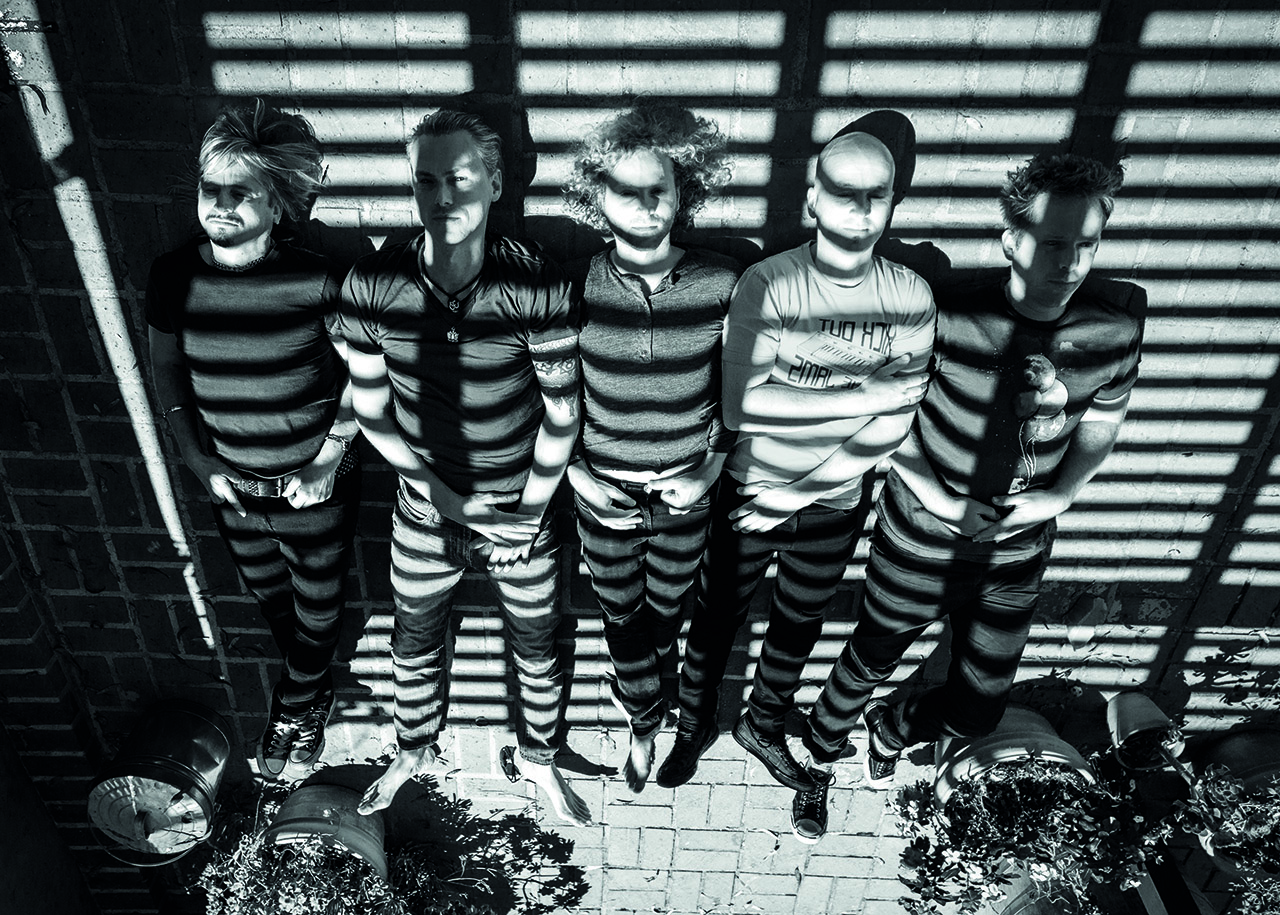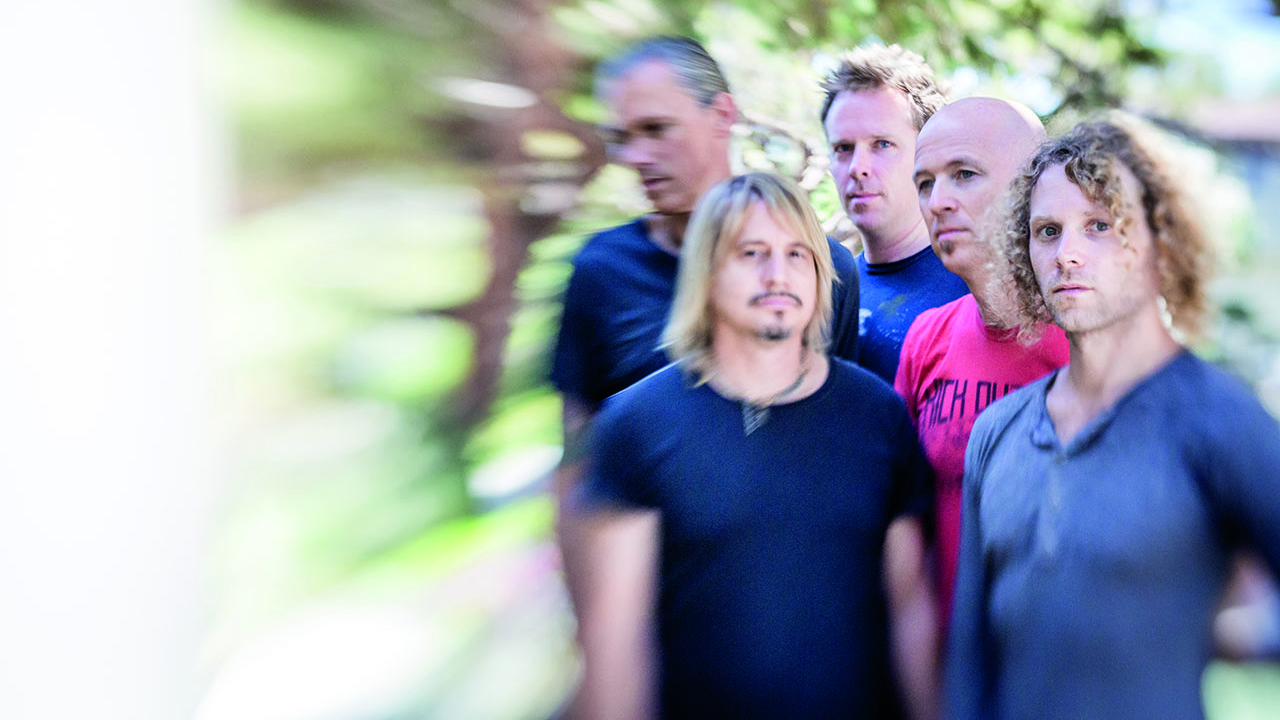By day, Ryan Hurtgen is a mild-mannered waiter working in a Los Angeles restaurant. By night, the lead singer of Perfect Beings prowls concert stages in a red cape that Superman might envy. During a typical show, the frontman changes costumes as often as Peter Gabriel did in his Genesis heyday.
For example, Hurtgen portrays a peasant farmer by baring his chest and wearing a straw hat. He embodies a Tom Waits-like character by utilising a cane and Bowler hat combination. And he relishes the opportunity to don a “Bubonic Plague” with a prominent beak.
“He really is a rock star on stage,” says Perfect Beings guitarist Johannes Luley. “You’ve got to see him.”
“Every show we’ve played, people have said, ‘That’s awesome,’” says Hurtgen. “Our music is deep. It means something. So I don’t mind putting a costume on and showcasing it that way.”
It’s a remarkable transformation for a singer who, two years ago, had been trying to find his true voice as a songwriter while writing pop songs in Nashville. The curly haired blonde frontman says he’s currently “jotting down ideas” for costumes to represent the songs on Perfect Beings’ second album. He’s going to need a bigger wardrobe. Perfect Beings II, the follow-up to the band’s self-titled debut (which garnered Perfect Beings a Limelight category nomination in this year’s Progressive Music Awards), boasts puff-chested confidence. In the tradition of Yes, Jellyfish, and Adrian Belew-era King Crimson, Perfect Beings II locates the point between unpredictable complexity and unforgettable melody.
Our music is deep. It means something. So I don’t mind putting a costume on and showcasing it that way.
“The second record is more of a progressive record than the first one,” says Luley. “We always get the ‘P’ word. I’m never really offended by the term ‘pop,’ honestly. But people mean it in an offending way at times. For us, it’s important that the music is accessible.”
One of the key differences between the two albums is that Hurtgen, who writes the main melodies, and Luley, who contributes the instrumental parts, were more familiar with the musical styles and abilities of fellow band members Jesse Nason (keyboards), Chris Tristram (bass) and Dicki Fliszar (drums). When the five men recorded their 2014
debut, they hadn’t even so much as played a gig together. Indeed, Perfect Beings were founded by perfect strangers who met by perfect accident.
In 2013, Hurtgen was in personal and creative freefall. After relocating from Nashville to Los Angeles, he was living in his car and then a sailboat. But the cross-country move seemed to pay off when the songwriter was commissioned to write and record a Christmas-themed tune for a movie. In search of a recording space, Hurtgen chanced upon Luley’s home studio and booked a session. From the off, the two men discovered they shared a mutual rapport.
The singer was impressed with Luley’s audio-engineering technique. The guitarist was taken with Hurtgen’s songwriting and voice. Luley, formerly a member of the San Francisco progressive rock band Moth Vellum, had been hankering to form a new group. Turns out it’s easier to find snow in Los Angeles than it is to come across a progressive rock musician. Hurtgen seemed like a promising nucleus to build a band around. There was just one slight hitch: the singer was only vaguely familiar with progressive rock.
“When he asked me if I wanted to join a progressive rock project, being a hipster in LA, I said, ‘I don’t know,’” Hurtgen admits.
When Hurtgen consulted a girlfriend, she told him, “You should write dance music or go into electronica songwriting. You should be getting a publishing deal and writing with rappers. Go that route, because that’s what’s popular.”
“I said, ‘Fuck that!’” Hurtgen recalls. “I want to play music, man.’”
The trade-off? Hurtgen now waits tables to pay the bills. (And, just in case you’re wondering, Hurtgen is quick to add that the girlfriend is now an ex.)
Luley began to tutor Hurtgen in progressive rock, introducing him to various artists ranging from John McLaughlin to King Crimson. The singer-songwriter rediscovered the Genesis and Pink Floyd albums that his father had played in the house when he was young. But Hurtgen ruefully recounts how his younger self became sidetracked by the likes of MC Hammer and then Limp Bizkit. Ah, misspent youth.
“It’s been really wonderful, at this age, to discover Yes,” says Hurtgen. “What a treat.”

Hurtgen had found his true musical home. The duo began to cast around for band mates. One of Luley’s audio engineer friends recommended Dicki Fliszar, who’d played drums in the solo band of Iron Maiden’s
Bruce Dickinson.
“Dicki’s not only an accomplished drummer but he’s also a songwriter,” says Luley. “He’s playing with Jack Russell’s Great White right now. I just went to see them in Hollywood a couple of nights ago and I was reminded where this guy is coming from. He is such a straight-up hard rocker!”
In turn, the drummer recommended Brian Eno-influenced keyboardist Jesse Nason, whom Hurtgen praises for his sense of melody and counterpoint. Nason is also a wiz at his day job.
“Jesse is a math professor. He teaches college,” says Luley, who jokingly adds, “But we’re not a math-rock band.”
Perfect Beings’ bassist Chris Tristram — who Luley describes as “the band’s secret ingredient,” — has worked with Slash and Marjorie Fair. Luley discovered him by posting an online ad.
“I think I wrote something along the lines of, ‘Chris Squire wanted’,’’ says the guitarist. “And we found him! That was his claim to fame. He had all these videos of [himself playing] Chris Squire covers online.”
It’s been really wonderful, at this age, to discover Yes. What a treat.
Perfect Beings took their band name from a lyric on the first album’s catchy debut single, Helicopter, a two-and-a-half minute whirligig of pop, prog, and psychedelic sounds. Rave reviews, word-of-mouth, and impressive YouTube music videos helped Perfect Beings to build a global audience even though the five men have yet to play a show outside of California. (They are, however, booked to play the RoSFest 2016 in Gettysburg, Pennsylvania.) That robust fanbase was what enabled Perfect Beings to crowdfunded their new album.
On Perfect Beings II, the band set out their stall on the opener Mar Del Fuego. Luley says that the piece typifies Hurtgen’s impressionistic compositional style.
“His chord structures always remind me of Debussy and Ravel. He uses Major sixth chords and stuff. It inspires me, in turn, to go there as a producer. That’s how the flute came about in The Love Inside and Mar Del Fuego.”
Mar Del Fuego begins with a squall of vintage keyboards. Gusting updrafts of lead guitar spiral around the downdraughts of Rickenbacker bass and thunderbolt drums. When the storm eventually dissipates, the entrance of Hurtgen’s vocals has a rainbow effect. Hurtgen’s stage presentation may be theatrical but his voice certainly isn’t. He sings in a naturalistic style. Think Steven Wilson with an American accent.
“For me, the album is a concept album because it goes into a discovery of self,” says Hurtgen, an avid student of New Age philosophy. “The idea of trying to find yourself, trying to love yourself, trying to understand what you’re doing on this planet. A lot of existentialism.”
To that end, the following track Cryogenia acts as a metaphor of sorts about awakening to self-discovery. It depicts an astronaut emerging from hyper-sleep as he approaches the Earth.
“This is the most prominent drum track,” observes Luley, who contributes an emotive solo to the climax. “When we were recording it, I told Dicki, ‘Pretend you are this guy who was frozen for 60 years and now you’re coming out of it. You barely know how to hold a drum stick, much less play a groove.’ I made him play stop-and-go.”
The album’s epic piece, The Love Inside, features more left turns than the British Labour Party under Jeremy Corbyn.
“The end section includes this ELP-style riff because I was listening a lot to Trilogy at the time,” says the guitarist. “Jesse and I are dueling each other, if you will. Then at the end it collapses into a reprise of an earlier part of the song.”
The second half of the album consists of shorter pieces ripe for harvesting as singles. Go, for instance, may prove irresistible to fans of Peter Gabriel pop-funk tunes such as Big Time and Steam. But even the concise songs feature striated layers and exploratory tangents.
“I’m not writing pop songs like I was in Nashville. I’m becoming more of a composer and orchestrator of bigger ideas,” says Hurtgen. “I’m not doing it for money. I’m not in it for fame, obviously. So why am I doing it? It really comes down to doing something that I strongly believe in. Some of that is what the second album is about.”
Luley observes that this is the first time he’s been in a band with someone who actually has something to say.
In response, Hurtgen deadpans, “We should do a song about cars and girls.”
But the singer’s appreciation of Luley is equally genuine.
“I feel very blessed,” concludes Hurtgen. “I’ve gotten a musical education just from being in this band that I could never have imagined.”
Perfect Beings II is released October 16 on My Sonic Temple. See www.perfectbeingsband.com for more information.
